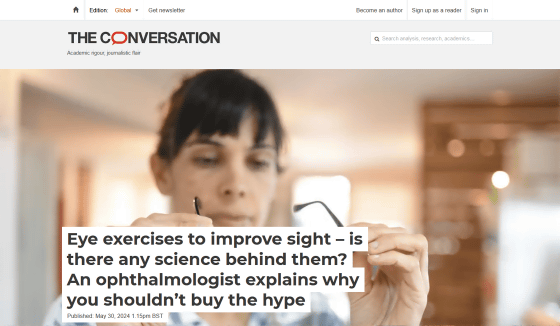Is there any point in 'eyesight recovery training'?

For people with poor eyesight, 'vision recovery training' seems attractive, claiming that vision can be restored by applying pressure to the eyes with the palm of the hand, moving the eyes around, or reading letters with glasses that are not the correct prescription. However,
Eye exercises to improve vision – is there any science behind them? An ophthalmologist explains why you shouldn't buy the hype
https://theconversation.com/eye-exercises-to-improve-sight-is-there-any-science-behind-them-an-ophthalmologist-explains-why-you-shouldnt-buy-the-hype-217655

◆Effects of vision recovery training
There are many different methods of vision rehabilitation on the Internet, such as 'pressing eye acupressure points,' 'rolling your eyes,' and 'reading with the wrong glasses.' However, Botsford says, 'As a professor of ophthalmology and an ophthalmologist who has seen thousands of patients, I can say with confidence that there are no studies that provide strong evidence that these exercises eliminate the need for glasses or provide significant long-term benefits . There is no scientific basis for vision rehabilitation.'
The lack of scientific evidence applies to virtually all eye conditions and diseases, including myopia, a condition in which close objects appear clear but distant objects appear blurry, and hyperopia, a condition in which distant objects appear clear but close objects appear blurry.
Botsford also points out that vision recovery training is ineffective for presbyopia, which makes it difficult to focus on nearby objects. Unlike myopia and hyperopia, presbyopia is caused by the lens of the eye becoming harder as we age, making it difficult to focus on small or fine text. Some people claim that vision recovery training can reduce the need for reading glasses, but the evidence is limited .

What you can do to protect your child's eyesight
While there is no scientific basis for vision training for adults, there are some things you can do to protect your child's developing vision. In countries like Japan, all children are given regular eye tests to measure their eye health, and if there are problems, they are encouraged to wear glasses. If vision problems are not addressed, or children who need glasses are not given glasses, this can lead to vision problems and amblyopia.
Myopia is a particular problem in children, but the progression of myopia can be slowed by avoiding using smartphones and PCs for hours on end.
Looking at a screen for a long time can cause eye strain and dry eyes, so Botsford recommends taking breaks according to the '20-20-20 rule.' The '20-20-20 rule' is to take a 20-second break every 20 minutes of looking at a screen and look at a place 20 feet (about 6 m) away from the device. This allows you to rest your eyes moderately and protect your eyesight. In addition, relaxing your eyes and concentrating on blinking, or using artificial tears that can be purchased at drugstores, etc., can also help prevent dry eyes.

◆ Blue light blocking glasses and supplements
Botsford also warns against supplements or natural remedies that claim to be a cure-all for all eye conditions: 'These claims are not backed up by rigorous scientific evidence and there is no evidence they will improve vision, reduce floaters or eliminate the need for glasses,' Botsford says.
One study showed that taking the over-the-counter vitamin AREDS2 supplement slowed the progression of moderate age-related macular degeneration in some patients, but the supplement did not help those with early stages of age-related macular degeneration or those who had no signs of the disease.

Actions that help with eye health
For some eye conditions, some form of vision therapy may be recommended, but these are best treated by an eye doctor and are not home exercises that will eliminate the need for glasses.
When it comes to overall eye health, Botsford says, 'A diet rich in vegetables and other healthy foods may help reduce the incidence of some eye diseases . Studies also show that exercise is associated with a lower risk of developing glaucoma and age-related macular degeneration.'
In addition, to protect your eye health, Botsford advises that it is important to 'avoid rubbing your eyes,' 'remove makeup from your eyelids and around your eyes before going to bed,' 'not sleep with contact lenses in,' and 'quit smoking or avoid smoking as much as possible.'
◆ Forum is currently open
A forum related to this article has been set up on the official GIGAZINE Discord server . Anyone can post freely, so please feel free to comment! If you do not have a Discord account, please refer to the account creation procedure explanation article to create an account!
• Discord | 'Have you ever tried exercises, goods, or supplements to improve your eyesight? Did they work?' | GIGAZINE
https://discord.com/channels/1037961069903216680/1247476960918241371
Related Posts:
in Science, Posted by log1h_ik







